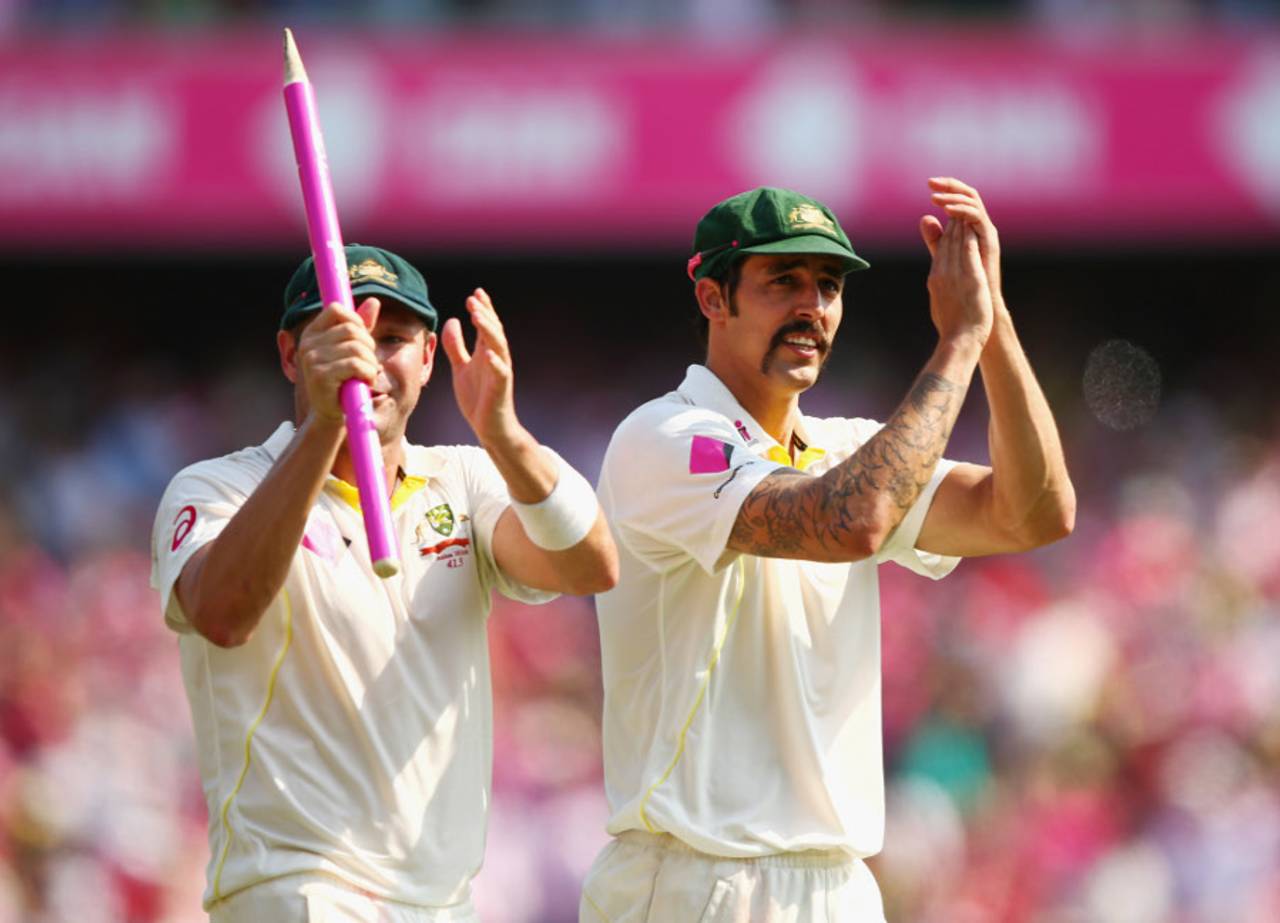Centuries all down the middle, and the first Test cricketer to be born
Also: most years between matches for Sri Lanka, and the overseas captain who led in the most Tests in England

Ryan Harris and Mitchell Johnson took 209 wickets between them in the Test matches they played together • Getty Images
Ryan Harris finished his Test career with 113 wickets in 27 Tests, at the excellent average of 23.52. No one took more wickets for Australia in those 27 matches - but no one played in them all, either: next comes Mitchell Johnson, with 96 wickets at 20.71 in 17 of the matches Harris played, then Nathan Lyon with 75 at 32.36 in 20, and Peter Siddle 55 at 32.00 in 19. Of the nine Australians who took seven or more wickets in the matches in which Harris played, only Johnson has a better average. If you look at all Australia's 56 matches since Harris made his Test debut in New Zealand in March 2010, only that same trio have taken more wickets than him, all from more appearances: Johnson 148 in 65 matches, Lyon 146 in 41, and Siddle 132 in 39. Next comes Ben Hilfenhaus with 65.
The oldest Test team of all was England's touring team in the West Indies in 1929-30, which for a start included two 50-year-olds (Wilfred Rhodes and George Gunn) as well as a couple more aged more than 40. The average age in the final Test, in Kingston, was 37 years 188 days; England's teams in all four Tests of that series occupy the top four spots in this particular list. Next comes England's team for the final Ashes Test in 1920-21, in Sydney - the average there was 36 years 306 days. Australia's oldest team was 35 years 341 days, for the Ashes Test of 1926 at Lord's. The youngest average age for any Test team was 20 years 298 days, by Zimbabwe against Bangladesh in Dhaka in 2004-05.
That's a good guess, as Allan Border captained throughout three six-Test Ashes series in England, in 1985, 1989 and 1993, a total of 18 in charge. Another Australian, Joe Darling, comes next: he also skippered in three Ashes series - 1899, 1902 and 1905 - but they were all of five Tests, so he ended with 15 as captain in England. Next comes Clive Lloyd, who led in 14 Tests in England in 1976, 1980 (when he missed one) and 1984. Only nine Englishmen have captained in more home Tests than Border: Andrew Strauss leads the way with 31, ahead of Michael Vaughan (29), Mike Atherton (28) and Peter May (26).
The recall of Jehan Mubarak to play against Pakistan in the third Test, in Pallekele, came seven years and 202 days after his previous Test appearance, against England at the Sinhalese Sports Club in Colombo in December 2007. In that time Sri Lanka had played 63 Tests. As it turns out, Mubarak lies second - just - by both calculations for Sri Lanka: there were 69 Tests (but only seven years 185 days) between legspinner Malinga Bandara's Test debut in May 1998, and the second of an eventual eight Tests in December 2005. And there were seven years and 219 days (but only 62 matches) between fast bowler Dulip Liyanage's eighth Test, in January 1994, and his ninth and last one, in August 2001. The overall records are held by the Egyptian-born offspinner John Traicos, who went 22 years 222 days between Test appearances (for South Africa in 1969-70 and Zimbabwe in 1992-93) and the England seamer Martin Bicknell, who missed 114 Tests between 1993 and 2003.

The match you're referring to was the recent high-scoring draw at Edgbaston, when Sussex's 601 for 6 included centuries from Chris Nash, Luke Wright, Ben Brown and Ashar Zaidi (Warwickshire replied with 612 for 6, including a county-record sixth-wicket stand of 327; all 11 Sussex players had a bowl). Sussex's innings provided only the third instance in first-class history of Nos 4-7 all making hundreds. The first occasion was in a Test in Faisalabad in 1982-83, when Javed Miandad, Zaheer Abbas, Saleem Malik and Imran Khan all made centuries for Pakistan against India. And it also happened in a Championship match at Lord's in 2001, when Stephen Fleming, Ed Joyce, Paul Weekes and David Nash all scored hundreds for Middlesex against Warwickshire. Oddly, the highest of the four that time was 107.
The answer to this is, perhaps unsurprisingly, the same person: England's James Southerton was the oldest person to appear in the inaugural Test, against Australia in Melbourne in 1876-77 - he was 49 years old, and remains the oldest Test debutant. Southerton was born on November 16, 1827. He died not long after his brief taste of Test cricket, succumbing to pleurisy on June 16, 1880, aged 52. Another England Test cricketer died later that year: GF "Fred" Grace, the younger brother of WG, died of pneumonia in September, aged 29, just a fortnight after bagging a pair in his only international appearance, against Australia at The Oval in the first Test ever played in England.
Steven Lynch is the editor of the Wisden Guide to International Cricket 2014. Ask Steven is now on Facebook